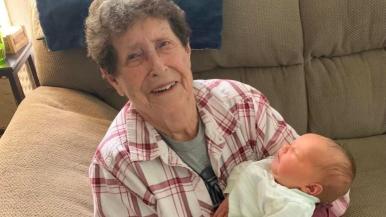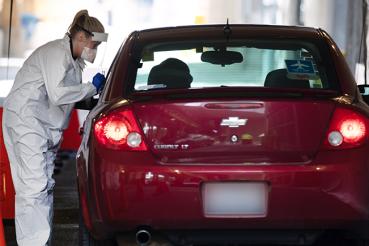Alex Current and his family have, like most people, spent the past few years trying to protect themselves from COVID-19. Alex’s grandmother Phyllis had emphysema, and the family knew that a COVID-19 infection could be bad for her.
Unfortunately, Phyllis tested positive for COVID-19 in late January, during the omicron surge. When her symptoms progressed, Alex turned to his friend, Nicole Marks, a nurse practitioner at RUSH, for advice. Marks told Alex that taking Phyllis to RUSH was her best shot at beating COVID-19.
Within an hour of arriving, Phyllis — Alex’s legally adoptive mother — was given a bed in the ICU. She improved and was eventually moved to a regular hospital floor, but when it was time for Phyllis to be discharged, a nurse told the family that Phyllis would need 24-hour care and supervision. While Alex’s birth mother thought that would be no problem, Alex knew that wouldn’t be feasible for his family.
Alex asked Nicole for advice again, and Nicole suggested that he contact social services at Rush.
As Alex and his family coped with Phyllis’s illness, RUSH social workers and nursing staff provided support that proved instrumental to the Current family.
‘Tell me your story’
Enter Ellie Plonsky. Alex got Plonsky’s phone number from the nurse in charge of Phyllis’s care, and he called and left a message. Within an hour, Plonsky called back. She simply said, “Tell me your story,” and Alex poured his heart out to her.
“A major tenet of social work is meeting people where they’re at and giving them the support they need at that time. I could tell when I first talked to Alex that he needed emotional support, and that he also needed a point person for communication,” Plonsky says.
“With many of my COVID-19 patients, family members are often in distress, and it can be exacerbated by not having direct contact with their family member.”
Plonsky also recognized that Alex was comforted by being in the know, so she called him multiple times a day to let him know that she was there for him, and to give him updates. They forged a strong rapport through that repeated contact.
Forming a therapeutic bond
Alex and Plonsky began to collaborate on a discharge plan that would work for Phyllis. Their first contact was on a Friday, and though Plonsky wasn’t working that weekend, she called Alex as soon as she was back on Monday.
“My favorite thing about working with Ellie,” Alex says, “was that she always called back earlier than expected and with more information than expected. She was realistic, but truly advocated for my grandmother’s care.”
“During such a distressing time, it was also therapeutic for me to form this bond with a patient’s family member,” Plonsky says. “I felt that my work was being honored and appreciated, and that’s something that can be hard to find in times like these with COVID-19 and many people in distress.”
Phyllis wanted to go to a rehab center that was close to her home, but the center had strict COVID-19 policies and initially would not take her because she was positive for COVID-19. When Plonsky heard this, she asked Alex for his grandmother’s COVID-19 timeline and asked the rehab center to make an exception for Phyllis. In the end, an exception was granted and Phyllis was accepted to her first choice of rehab facility.
“It was amazing that Ellie went through that extra amount of effort and paid attention to that detail,” Alex says. “She always had my grandma’s best interests at heart and knew ultimately that this was what Phyllis wanted.” Phyllis’s mental health had been declining while she was in the hospital, so the family knew that honoring this choice would mean a lot to her.
Phyllis’s condition later worsened, and she had to go back to the ICU. Plonsky stayed involved in the case for the first couple of days, but she ultimately had to transfer the case to someone else due to her caseload. “Ellie’s care and compassion was unmatched. The attention she gave our family was above and beyond what I would have ever expected,” Alex says.
‘If this was my family, this is what I would do’
Phyllis ended up going on a ventilator at RUSH, and her care team realized there was an issue with her brain, but that she wasn’t quite stable enough to go for a scan to confirm. Phyllis’s care team asked Alex and his birth mother to come to RUSH discuss her status. Alex then got the rest of the family on the phone and they, along with Phyllis’s care team, made the decision to take Phyllis off the ventilator.
“The ICU nurse that we talked to was incredibly compassionate. I asked her ‘are we making the right decision?’ She said, ‘if this was my family, this is exactly what I would do.’ I was comforted by that statement from the nurse and knew we were making the right decision.”
Alex recognizes that when a loved one dies, there can be a lot of regret and “should haves” and that it can be difficult to coordinate the care when you’re in the passenger seat.
“I am eternally grateful,” he says, “that we don’t have any ‘what ifs’. There is nothing we could have done that was any better, and everything worked out the way it was supposed to. If we didn’t go to RUSH, we would have just been planning Phyllis’s funeral from the start. RUSH gave us hope, and a chance, and that assurance was priceless.”




